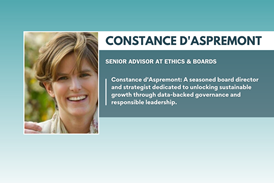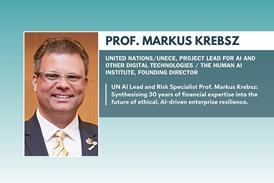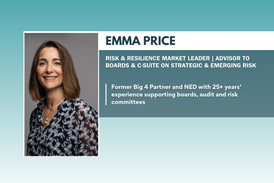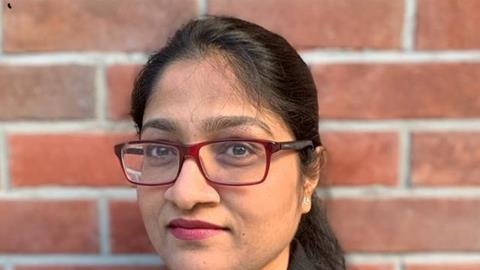Sujata Dasgupta is rapidly becoming one of the financial crime compliance sector’s rising thought leaders and has just landed a major award for her efforts. On International Women’s Day, and ahead of her session at FinCrime World Forum, Dasgupta talks about her work, inclusivity in financial crime compliance and how to inspire the next generation.
If you regularly read thought leadership articles about financial crime there is a very good chance you will have come across the work of Sujata Dasgupta.
The Sweden-based industry leader has over two decades of experience across New York, London Singapore, Frankfurt, Hong Kong and the Nordics, leading and advising on financial programmes at major financial institutions. She regular shares her insights and knowledge through columns for multiple publications.
Her articles often focus on the use of technology, including AI and biometrics, to improve Know Your Customer and other aspects of regulatory compliance with a strong emphasis on future-proofing against crises.
Her impressive body of work has gained international attention and last week she was named Risk Professional of the Year at Women In Technology & Data Awards 2021, run by WatersTechnology magazine.
Dasgupta explains that the award was given for her broad involvement and contributions towards financial risk and compliance knowledge, as opposed to any specific project for her organisation Tata Consultancy Services
She says: “I am a prolific writer, I share a lot of points of views and ideas and innovative solutions.
“I also do a lot of webinars and events where I talk about leveraging data through digital and technology in the era of financial crisis management.”
Our interview with Dasgupta is taking place on International Women’s Day, amid celebration of the social, economic, cultural, and political achievements of women in industries across the world. So where does Dasgupta think financial crime compliance sits in terms of inclusivity and opportunity for women?
Dasgupta believes that women have broken the glass ceiling and there are “a lot of women in powerful positions” in the industry. However, she is doubtful that women are represented adequately in all areas.
“We know that there are strategic decision-making bodies where women are present, including in areas of anti-financial crime and prevention. But whether women are present in the implementation and execution levels, across all ranks, is something which we do not know, the statistics are not visible to us.”
Dasgupta believes the industry won’t be fully inclusive until women are more prevalent in all areas, from decision-making to implementation to the front line. “The first line intervention point is what I believe would make the difference”, she says.
So, apart from the gender inequality that plagues every industry, is there anything about the world of financial crime that may provide a barrier to inclusion?
Dasgupta says she has heard theories that the word ‘crime’ coupled with finance, which has itself arguably been a male-dominated pursuit, may make women apprehensive about starting a career in the industry.
She says that this is all perception and urges people not to restrict themselves based on their gender. “I don’t think any aptitude can be attributed to a ‘male-related skill’ or a ‘female-related skill’
For Dasgupta the answer is awareness and education to counter any suggestion financial crime compliance is restricted to any group, including men.
“It’s about your abilities, it is about learning new skills and financial crime itself is developing and becoming more complex”, she says.
“The skills to fight it should also be inculcated, we are all humans and we all have the ability to learn. So if everybody learns, and becomes aware that this is a skill, which needs to be acquired and learned and matured over the years, I think that will break that barrier.
“It is about awareness and giving everyone an equal opportunity”.
Creating more opportunity is vital of course, but how do we ensure that the next generation of women, and men, want to take the opportunity of working in financial crime? How do we inspire?
Dasgupta argues that the focus must move beyond merely focusing on potential regulatory penalties and instead focus on the wider impacts of criminal behaviour.
“There is money coming in from human slavery, drug trafficking, illegal arms and so on, there is a huge human impact. There are environment impacts, such as wildlife trafficking, which is impacting on ecological balance.
“And then there is the economic impact. On average there is $2 trillion per year sucked out of the legal economy. That is money that could have been used for the welfare of the people.”
As our conversation nears its end, we ask Dasgupta about her FinCrime World Forum panel session in a little over a fortnight’s time. Dasgputa is chairing the discussion, which will focus on reshaping the future for compliance following the pandemic.
She says: “How do you plan ahead? What can you do for the future? you have to be disaster proof , but you also have to be future-ready with so much happening.” Dasgupta does not want to give much more away about the session ahead of the event, but promises the “phenomenal” panel will provide lots of ideas to these questions.
Sujata Dasgupta is speaking at “Reshaping the Future, Planning- Compliance Priorities in Uncertain Times” at 9.15am on 23rd March at FinCrime World Forum












No comments yet